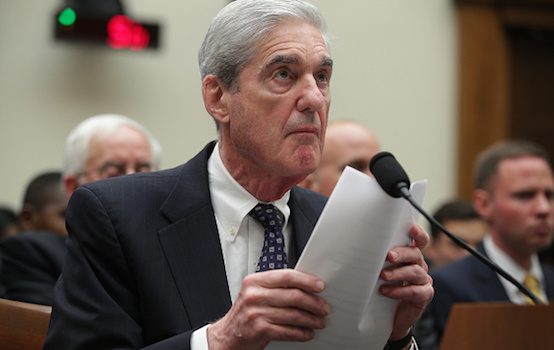Mueller Magoo

The late Sen. Arlen Specter ended the drive to impeach Bill Clinton by invoking Scottish law and voting “not proven” in the 42rd president’s Senate trial. Democrats hope to begin the drive to impeach Donald Trump with a finding by special counsel Robert Mueller that the worst allegations against the 45th president are not proven.
Even this task was made more difficult by the former FBI director and Trump-Russia investigator’s unimpressive public congressional testimony. Mueller had trouble identifying questioners. He demonstrated a thin grasp of his own report’s findings, even as he implored lawmakers in both parties to read it. He asked members of Congress to repeat their questions 48 times.
The uber-competent G-man about whom liberals sang Christmas carols was not on display Wednesday. “Mueller Time” gave way to Mr. Magoo.
A cursory glance at Politico’s homepage revealed the damage. “‘Euphoria’: White House, GOP exult after a flat Mueller performance,” blared the top headline. Another reads, “Bob Mueller is struggling.” And another: “Impeachment drive slowed by Mueller’s troubles.” Even the New York Times could only manage: “Mueller sticks to script but shows flashes of indignation.”
“This is delicate to say, but Mueller, whom I deeply respect, has not publicly testified before Congress in at least six years,” fretted Barack Obama’s man David Axelrod. “And he does not appear as sharp as he was then.”
That’s not to say Mueller did nothing for Democrats. He said President Trump was not “exculpated” by his report. He raised the specter of falsified documents and all but said that he punted on obstruction of justice only because a sitting president cannot be indicted under existing Justice Department guidelines. He gamely testified his investigation was no “witch hunt.” And some of his seeming confusion was likely strategic: he was trying to avoid giving partisans easy footage confirming their talking points.
But Democrats wanted much more. Ever since Attorney General William Barr released his summary, they have wanted to challenge his framing of the report. His testimony, like that 448-page document, contained plenty of damning information. The bottom line—that Mueller could not prove a Trump-Russia conspiracy to swing the 2016 presidential election and lacks a convincing explanation for his obstruction equivocation—remains unchanged.
While Democrats have not totally given up on “collusion,” moving the goalposts away from Hillary Clinton’s detailed explanation of how the Trump campaign conspired with Russia to fix the election toward vaguer references to “contacts” and “foreign help,” obstruction of justice was the name of the game. Mueller acknowledged that there was insufficient evidence to charge anyone in the Trump campaign with collusion-related crimes, even if he stopped short of calling that an exoneration of the president. Paul Manafort, George Papadopolous, Carter Page, Roger Stone—these were not criminal masterminds. In fact, they were all incredibly sloppy. If they had colluded, they all could easily have been charged.
If Justice Department regulations on presidential indictments did not prevent a finding of insufficient evidence to charge conspiracy, why did these guidelines require Congress to make the final determination on obstruction? No one who could be indicted was charged with aiding the president in obstructing the investigation either.
The real answer Mueller declined to give appears to be that his obstruction allegations would have hinged heavily on Trump’s use presidential powers under Article II of the Constitution. The Justice Department under Barr’s leadership does not believe this amounted to obstruction in theory or practice. Thus the self-evidently never-fired Mueller was reduced to dropping breadcrumbs and hoping congressional Democrats would find them.
Both parties entered the hearings with a fundamental problem. For Republicans, how do you discredit Mueller for his negative findings about the president while also affirming his failure to prove an election-related conspiracy as definitive? The Democrats’ dilemma was that they knew Trump had behaved badly in response to Russian election interference and the subsequent investigation, but hoped Mueller would discover something worse. When he merely supplied color and a reliable narrator for what we largely already knew, many Democrats wanted to pivot back to impeaching Trump over that unseemly behavior.
Mueller’s seeming lack of familiarity with his own investigation lessened the GOP’s problem because it helps shift the focus to the “angry Democrats” in the special counsel’s office—people like Andrew Weissman, who attended Hillary’s election night party—rather than Mueller himself. The Democrats are still at square one, trying to dial back Manchurian candidate expectations among the base and shift the impeachment rationale to Trump’s passive willingness to benefit from Russian interference without expressing a modicum of outrage.
You can argue that we should expect more from a president than to simply have refrained from directly conspiring with a hostile foreign power to reach the White House. Yet that case becomes harder to make when that is precisely what you have conditioned rank-and-file Democrats to expect from the Mueller report. No dramatic reading of that report, least of all by a 74-year-old clearly no longer accustomed to congressional testimony, will deliver on those expectations.
With 95 Democrats willing to impeach Trump over mean tweets, anything is possible. But it’s going to take a lot more than Mueller to move House Speaker Nancy Pelosi into that camp.
W. James Antle III is the editor of The American Conservative.
Comments